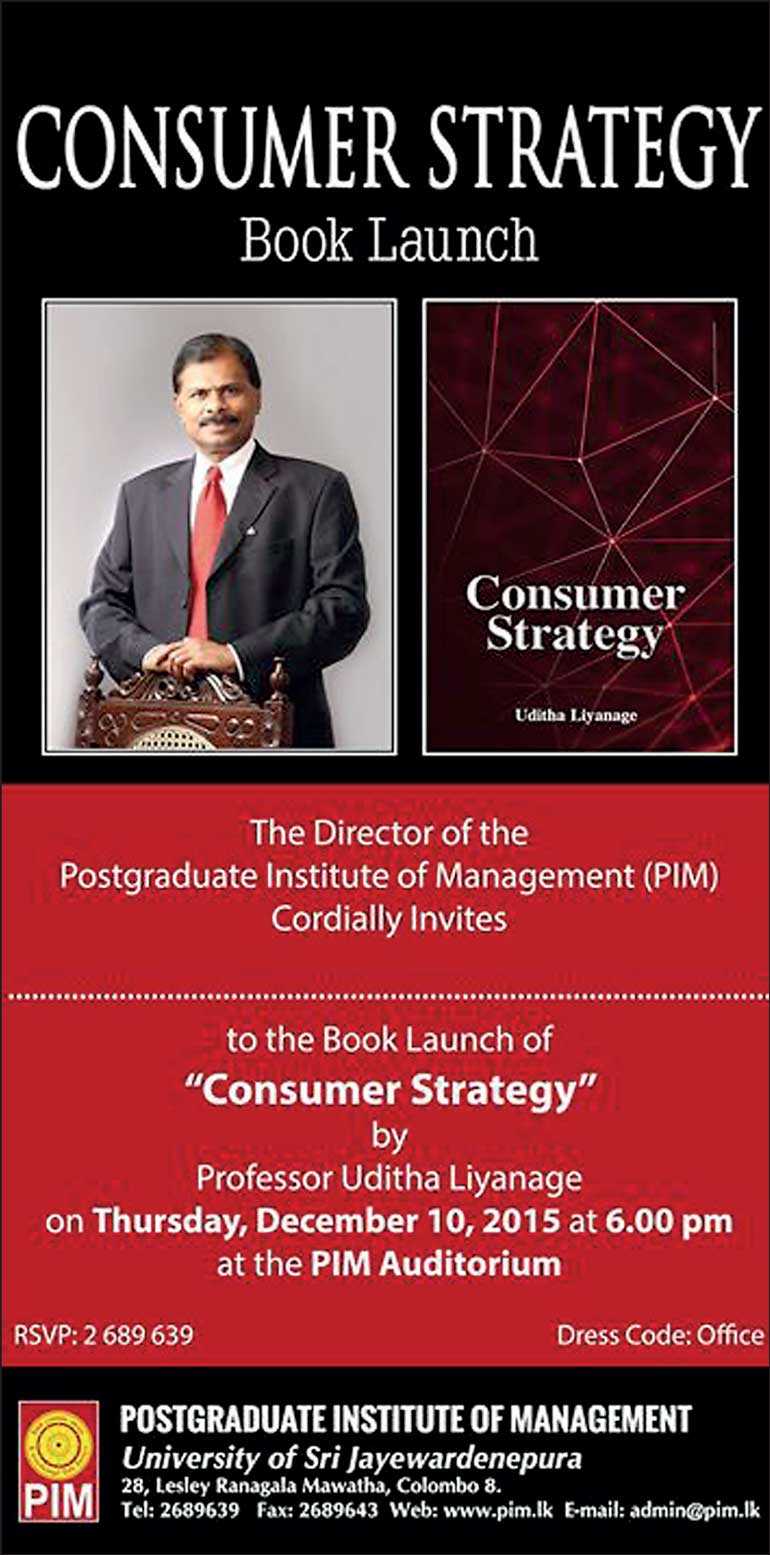Saturday Feb 07, 2026
Saturday Feb 07, 2026
Friday, 9 August 2019 00:00 - - {{hitsCtrl.values.hits}}

Today, 9 August, the first-ever Biannual Professor Uditha Liyanage Memorial Speech will be delivered by Deshamanya Dr. Mahesh Amalean at the PIM. The event is organised by the PIM, SLIM and CIM. 
On his fifth death anniversary, it is opportune to reflect on the unique contributions he made to the advancement of marketing and management thinking by referring to his publication ‘Consumer Strategy’.
The book contains 20 articles personally selected by Professor Liyanage himself. Providing an apt preface, his successor Prof. Ajantha Dharmasiri captures the core of the book by saying, “As it has always been, Prof. Uditha Liyanage invites us not just to read the book, but to recognise the key themes, reflect on the main ideas, relate the concepts covered to the current challenges. It should reinforce the way how one professionally applies the key lessons, in playing a managerial and leadership role in one’s workplace. In essence, knowing should lead to doing and in turn will deliver results.”
Going through these articles at one go is challenging because of the intellectual richness of them and the academic rigor with he argues his points. But certainly this is good companion to any serious student of management.
When go through we can not only read but hear the eloquent speaker Uditha, his mastery of language needs separate consideration and evaluation. His choice of words and the organising of thoughts has his signature style throughout the book. One cannot help but visualise how he makes a point when delivering a lecture while reading the book.
As Ajantha has mentioned, Uditha is one of the most conceptually rich professionals that you can come across. In these articles it comes out over and over again how he synthesises conceptual models and frameworks to articulate his observations, theories and concepts. As a marketer I can see how he explores the battle of the market place within the arena of the mind!
Tangibility as a mental construct
His contribution towards the discussion of tangibility as a mental construct is a case in point. The paper ‘Goods-Services Dichotomy: The place of the Tangibility Construct’ examines the tangibility construct and provides a basis for product classification and the development of strategies for both goods and services alike.
The classification of products, based on tangibility as a mental construct, rather than on their physical evidence, helps to classify products which have varying degrees of tangibility in the minds of consumers. Some so-called services may be highly-tangible in consumers’ minds while some physically-evident goods are of low tangibility. Tangibility viewed as a mental construct does not form the basis for the traditional goods and services dichotomous classification. Instead, it helps to classify all market entities on a continuum of high low tangibility.
While perusing these articles we see Uditha as a marketer and a true strategist, then as a marketer – sociologist, then as an academic with relevance.
Compulsory reading
The three articles ‘The Post-Modern Consumer,’ ‘Profiling the Sri Lankan Consumer,’ and ‘Sri Lanka’s New Mod-Tradi Consumer’ must be made compulsory reading for every marketer who needs to practice in Sri Lanka. Those articles provides such rich insights that cannot be ignored by any marketer. In fact I feel this research must be continued by examining the changes that take place in a regular basis so that the evolution of the Sri Lankan consumer can be documented and studied by marketers making the insights current.
In addition to the empirical evidence he uses to make his points Uditha uses his keen observation skills, a rare capability among many marketers of today. This is best illustrated when he says: “A vivid metaphor that characterises and portrays the post-modern ‘I ME’ or the modi-tradi consumer is a youth clad in a faded pair of jeans and a branded T shirt and adorning the conspicuous ‘pirith nool’. The religious ‘pirith nool,’ thick and showy, is a symbol of traditionalisation and the pair of faded jeans is an expression of modernity. Both co-exist and are congruent in the eyes of the post-modern consumer. Paradoxically, the ‘pirith-nool’ now plays a projective ‘ME’ role, and the faded jeans are no longer an imposition on the reflective ‘I,’ the private self. There is a fusion of the two symbols and they co-exist in harmony.
In one of the article he challenges marketers to stop saying, “Here I am, and this is my offer,” but to listen to customer who cries out saying, “This is me, and here is what I need.”
Strategy
Uditha was quite fascinated about strategy. He not only argues the centrality of strategy to marketing success but brought about a number of frameworks and new paradigms inviting business leaders to re-evaluate what they consider focus. In that sense articles such as ‘Strategy and Society: From CSR to SRB’ and ‘Strategy and Complexity and Differentiation: The Quintessence of Strategy’ can be considered landmark contributions that need wider discussion by business leadership. For instance, in his observations on ‘Strategy and CSR,’ when he says, “Strategy is what the company wants to do in order to occupy a distinct position in the market. The corporation’s strategy inevitably impacts on society in multiple ways. When the corporation formulates and executes strategy, being cognisant of its impact on society, then the corporation’s actions are reckoned to be responsible,” he invites the reader to reflect on the whole relationship between the enterprise from a completely different point of view.
Though his thoughts are so profound, yet he tries to link his idea to very simple expressions. In different stages of corporate social responsibility activities, he groups them into ‘Give,’ ‘Give to Get,’ and ‘Do-Get,’ and proposes that corporations should aim to reach the level of Socially Responsible Business. (SRB) and his definition for that is: The aim of SRB is to profitability serve the socioeconomically disadvantaged people, in an environmentally-friendly manner, through innovative products and services, that are financed, sourced, processed, delivered, communicated and priced keeping in mind the constraints and limitations of the end beneficiaries.” This shows visionary nature of approach and clarity of thought.
Marketing function and war effort
The ‘Ten Lessons from the Military to Markets’ can be considered a unique contribution by Uditha in that he succinctly highlights parallels and draws lessons between the marketing function and war effort of the Sri Lankan Army – a must read for every business person.
Uditha was quite fascinated with the subject of strategy: “Planning is not strategy,” was his contribution to bring in conceptual clarity to the subject. “Strategy is often confused with planning.”
The many definitions and delineations of strategy, which highlight one or more aspects of strategy, while ignoring the others, have led to a state of confusion as to what strategy really is. To avoid the confusion in the minds of the practitioners, and as reflected in the literature itself, strategy quadrant consisting of Stand, Standing, Shared Values, and Supportive Resources and Capabilities, and Steps is proposed by Uditha.
Alcohol consumption and tourism positioning
As a leading professional, and authority on marketing Uditha was consulted by many an organisation including national as well as international. Two of such instances are also covered in this collection of articles. One is on the study related to alcohol consumption and the other was developing a positioning statement for Sri Lanka Tourism.
The article ‘Emerging Patterns of Illicit Alcohol Consumption with Special Reference to Sri Lanka’ must receive serious attention of national policymakers. He, with facts, argues: “An alcohol policy that disregards illicit alcohol is, indeed, myopic. Urgent steps must be taken to not only include it but also closely study the interplay between the legal and illicit markets, especially in areas which the uneducated and low income groups in habit.”
Uditha’s proposed positioning statement for Sri Lanka was “Asia’s diverse, authentic, and compact island”. Though this was accepted, it was never made use of. It had been developed with a careful and structured thought process, hence cannot be disputed or rejected by arguing. However, one can question whether it lacks the single-mindedness needed in a positioning statement.
Conceptual frameworks
Since the book contains a large number of conceptual frameworks developed by Uditha, perhaps it would have been a good idea to add an index of all those models at the end of the book, making it easy for one to refer to them. (However, they are available at http://www.pim.lk/index.php/prof-uditha-liyanage-strategy-and-marketing-frameworks/). Actually those conceptual frameworks help practitioners in implementing ideas into business and academics to further investigate and develop them.
His selection of a convocation speech as the last article in a way brings out the philosopher that was in Uditha. In the concluding paragraph of that speech, Uditha states: “The question is: what is knowledge about? For the Eastern mystic and thinker, all things and events perceived by the senses are inter-related, connected, and are different aspects or manifestations of the same ultimate reality. The dominance Cartesian, Western view, on the other hand, is to divide the perceived world into individual and separate things and to experience ourselves as isolated egos in this world. This view is seen as an illusion by the Eastern mystic and thinker. It is the illusion which comes from our measuring and categorising mentality. It is called avidya or ignorance and is seen as a state of a disturbed mind which has to be overcome.”
In many ways Uditha, even in the field of marketing and related subjects, was mystic and a thinker. This collection of articles goes to prove that.